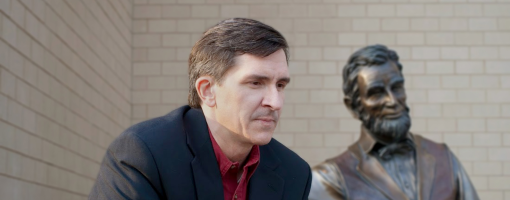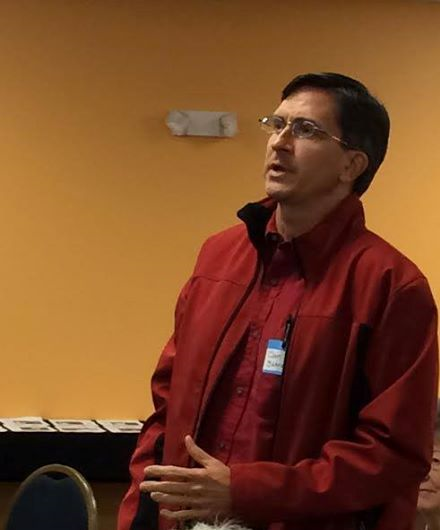 While many seasoned political observers believe that Democratic nominee Dave Domina, a wealthy trial lawyer, has already thrown in the towel in his uphill battle against Republican Ben Sasse in Nebraska’s lopsided U.S. Senate race, little-known Dan Buhrdorf — the longest of long-shots — wants his fellow Cornhuskers to know that he doesn’t give up without a fight.
While many seasoned political observers believe that Democratic nominee Dave Domina, a wealthy trial lawyer, has already thrown in the towel in his uphill battle against Republican Ben Sasse in Nebraska’s lopsided U.S. Senate race, little-known Dan Buhrdorf — the longest of long-shots — wants his fellow Cornhuskers to know that he doesn’t give up without a fight.
You’ll never see a white flag of surrender from him.
At least not as long as millions of Americans are still suffering from the near-catastrophic financial meltdown of 2008 — a lingering economic crisis in which the final chapter has yet to be written.
Narrowly falling short in qualifying for a spot on the general election ballot as a third-party candidate in August, the scrappy Lincoln resident and longtime antiwar activist recently filed qualifying paperwork to become an official write-in candidate for the U.S. Senate.
A thoughtful proponent of the long-neglected American System of Political Economy — the economic system advocated by Alexander Hamilton, Henry Clay and Philadelphia’s Henry C. Carey, Lincoln’s leading economic adviser, and later revived in modified version during President Franklin D. Roosevelt’s New Deal and John F. Kennedy’s New Frontier — the 46-year-old Buhrdorf says that he’s staying in the race to bring attention to the fledgling United Front Against Austerity’s (UFAA) economic program.
Buhrdorf, a fifth-generation Nebraskan, was a participant at the UFAA’s founding conference in New York City in October 2012.
Fully cognizant of the disconnect between the booming global equity markets and the underlying world economy, Buhrdorf says that the effects of the 2008 financial crisis are still being profoundly felt by millions of Americans, including tens of thousands of middle-income and poor Nebraskans.
While income inequality — the gap between rich and poor — has been a growing problem for more than three decades, it has been grossly exacerbated during the current economic downturn. According to one study, in the immediate aftermath of the Great Recession, the top 1% — those with incomes greater than $394,000 in 2012 — saw their incomes climb 31.4% during the three-year period between 2009 and 2012, while the bottom 99% experienced an anemic gain of only four-tenths of one percent.
Something is terribly wrong with that picture.

Like Lincoln, Buhrdorf is a strong proponent of the American System of Political Economy, a term coined by Henry Clay in 1824 to describe the three-thronged program of protective tariffs, internal improvements and a national bank.
“The only recovery,” says Buhrdorf, “has been a recovery for the rich. Most Americans are still suffering from a recession, if not a depression.”
But Buhrdorf is determined to change that.
He believes that his populist, New Deal-style economic program — unlike the woefully inadequate solutions espoused by his major-party opponents or by austerity-peddling independent candidate Jim Jenkins, a wealthy Callaway rancher who has been calling for major entitlement reforms based on the bipartisan, budget-cutting Simpson-Bowles Commission recommendations of 2010 — will lead to a real recovery while ushering in a period of extraordinary prosperity not seen since JFK’s administration, a heady period when GNP swelled by a staggering 33 percent, real incomes grew by 30 percent, and corporate after-tax profits doubled.
It was an unusually prosperous period in American history.
A blueprint for a genuine economic recovery based on industrial, scientific and technological progress, Buhrdorf’s bold and imaginative platform calls for a Wall Street Sales Tax — a one percent tax on the sale of stocks, corporate bonds and derivatives, with household investments protected by a $1 million annual exemption — and the nationalization of the Federal Reserve to fund badly-needed infrastructure improvements and other worthwhile projects.
The idea, says the low-key Buhrdorf, is to steer investment capital away from risky financial speculation and into productive activities that create good-paying jobs and real economic growth.
“It’s a program designed to benefit Main Street, not Wall Street,” he told Uncovered Politics.
Alone among this year’s U.S. Senate aspirants across the country, the University of Nebraska-educated candidate rejects the free trade dogma pushed by Democrats and Republicans alike, and calls for tariffs to protect American industry and jobs — at least the remaining few that haven’t yet been outsourced.
Buhrdorf’s forward-looking platform also calls for low-interest student loans, a steep increase in the minimum wage, and agriculture parity — an idea rooted in FDR’s New Deal.
He also favors an ambitious Medicare-for-All healthcare plan to replace President Obama’s increasingly unpopular Affordable Care Act.
Though he says he agrees with several of his opponents that Obamacare is bad for the country, the prairie populist argues that it would be a tragic mistake to “return to a free market system that let countless Americans die for Wall Street’s profits.”
While his Democratic opponent appears to have conveniently taken a powder in the campaign’s closing days, Buhrdorf has been focusing most of his attacks on frontrunner Ben Sasse, warning Nebraska voters that the warmongering Republican will almost certainly “commit the U.S. military to hostile situations around the globe” while marching in lockstep with Kentucky’s Mitch McConnell — the likely Senate Majority Leader come January — in fulfilling his austerity, entitlement-slashing commitment to the right-wing Koch Brothers.
Despite being virtually abandoned by some of his key supporters after failing to qualify for the ballot a couple of months ago, the lifelong educator — he spent much of his career teaching in Taiwan before returning to Nebraska to care for his ailing parents — remains upbeat.
It’s worth the sacrifice, he says.
He also harbors no illusions about his last-minute write-in candidacy.
Having raised a modest $5,675 as of October 15th — a figure dwarfed by the more than $6.1 million reportedly raised by Sasse and the $1,083,000 hauled in by the Democratic nominee — Buhrdorf is essentially running “a poor man’s campaign” for the U.S. Senate.According to the Federal Election Commission, he’s also being vastly outspent by the two independents in the race, with the deep-pocketed Jenkins reporting contributions of nearly $477,000 and Todd Watson, a little-known certified public accountant and faith-based conservative who has given up on both major parties, reportedly raising a relatively impressive $151,057 as of his latest FEC filing, including personal loans of more than $122,000.
A mere pauper by comparison, Buhrdorf maintains that his presence in the race — a contest in which Sasse, a favorite of the Tea Party, leads his hapless Democratic rival by a whopping 29 percentage points — isn’t about how many write-in votes he might garner on Tuesday, but rather how many Nebraskans he can reach with his seemingly radical, yet quintessentially American, economic message.
The Nebraska Secretary of State’s office, incidentally, has informed Buhrdorf that it will only publish the results if a write-in candidate polls a minimum of 5,000 votes in the senatorial contest — a lofty goal, to be sure.
But the feisty yet good-natured Lincoln activist remains undaunted. “We’ll see what happens,” he shrugged wistfully, adding that his campaign was more about promoting ideas than garnering votes.
“This is an educational effort, an opportunity to publicize the UFAA’s desperately-needed economic program,” continued Buhrdorf, a soft-spoken man who plans to run dozens of 30-second radio spots in Lincoln and Omaha, the state’s two largest metropolitan areas, during the final days of the campaign. His first radio spots will begin airing Saturday morning on Omaha’s KGOR 99.9 FM and KFFF 93.3 FM, with additional ads running in Lincoln and surrounding communities.
“Let’s save Social Security and Medicare by shifting the tax burden off hard working taxpayers and onto Wall Street with a Wall Street Sales Tax,” says Buhrdorf in the ad. “Let’s use the Federal Reserve to create high-paying jobs, 21st Century infrastructure, industry, and power without adding to the debt.”
Nebraskans need to be made aware that there are alternatives to the growing dominance of Wall Street in American politics, contends the affable write-in hopeful. “The American people — not some nameless, faceless financial oligarchs — should be shaping the country’s future.”
He’s right. The federal government shouldn’t be handmaiden to the so-called investor class — the “leisure class,” or privileged and pampered one percent — as sociologist Thorstein Veblen, a brilliant and non-doctrinaire economist and advocate of the American System, once described them.
That’s not something that our elected representatives in Congress — Democrats and Republicans alike, an ungodly number of whom are millionaires or multimillionaires themselves, comfortably numb to the suffering endured by millions of ordinary Americans during this seemingly never-ending economic crisis of Wall Street’s making— can possibly understand or fully grasp.
It’s also not the kind of populist perspective that Buhrdorf’s relatively affluent rivals — Ben Sasse, Dave Domina and Jim Jenkins, each of whom is likely to be just another foot soldier fighting on behalf of the financial elite — are likely to champion on Capitol Hill.
Dan Buhrdorf is a good and decent man, the kind of gutsy and thoughtful individual — in an ideal world — who should be representing us in the U.S. Senate.
Unlike his three major opponents, there’s little chance that he’ll turn out to be yet another toadied errand-boy for the financial titans on Wall Street — the avaricious Lords of Finance who recklessly destroyed the U.S. and global economy almost seven years ago and have prospered obscenely ever since. It’s no coincidence that there are now 1,645 billionaires in the world, more than twice as many as before the financial crisis, while the number of millionaires in the United States has increased substantially.
Buhrdorf will fight for ordinary Americans.
With a simple stroke of the pen, Nebraskans should send Washington — and Wall Street — a powerful message on Tuesday by writing in D-A-N B-U-H-R-D-O-R-F.




I agree wholeheartedly with your assessment, Mr. Richardson! Dan Buhrdorf is smart, articulate, compassionate, and respectable – all the qualities that Americans should want in a legislator.
In talking with my friends, co-workers, even strangers I find that most are disillusioned with the 2-party system and the rampant, permeating corruption. It will take time, but over the next 2 years we must encourage and find more Dan Buhrdorfs around the country.
Please, everyone, go to DanforNebraska.com and find out what a real, common sense economic recovery can look like.
Be sure to vote and if you’re in Nebraska, please write in DAN BUHRDORF for US Senate.
Pingback: Uncovered Politics: Feisty Nebraskan Launches Write-In Candidacy for Senate | Independent Political Report